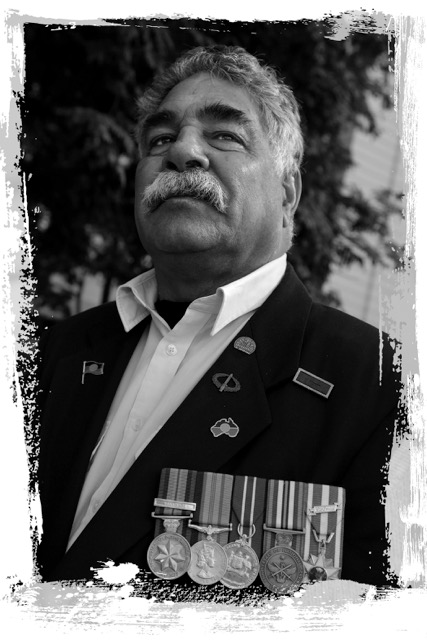Leslie George Anderson
Gangulu and Wujal Wujal Man
Private
3rd Battalion Royal Australian Regiment
Royal Australian Infantry Corps
Australian Army
Vietnam Veteran
Medals
Australian Active Service Medal 1945-75 with clasp Vietnam
Vietnam Medal
Australian Defence Medal
Anniversary of National Service 1951-72 Medal
Republic of Vietnam Campaign Medal
Infantry Combat Badge
Firstborn to Vernon Leslie Anderson and Winnifred Josephine (nee Law) in Cracow in 1949, I became the eldest of their 13 children: 7 boys and 6 girls. All were raised in the nearby Central Queensland Callide-Dawson Valley township of Theodore. I went to register in Rockhampton in 1970, and the bloke sitting behind the desk said, Mr. Anderson, you don’t have to register for national service (YEAR) And I said, why is that? He said, because you’re Aboriginal, so you don’t have to go to war. But I said, hang on I might be an Aboriginal, but I’m certainly an Australian, I was born here and as I said, put my name down and bloody all came up. I was proud and scared at the same time. Dad was proud of me but Mum didn’t like it much, her oldest boys heading off to war and may not come back alive.
Anyway, it was exciting for a young fella from the bush, and other blokes were the same. We were in the same sort of boat, plucked out of little country towns or plucked from the city having to suddenly train and possibly go to this war. That’s where you made good mates. So you did a six week crash course and then they posted us to a battalion at South Australia, which was the third Royal Australian Regiment and that’s where I stayed until we were ready to go over.
We were shipped on the HMAS Sydney, when you get there, it hits you the heat of the jungle and well, knowing you’re in another country that’s not welcoming you with open arms. We started to do our endless patrols with patrol and mine was Bravo Company, Fifth Platoon, three RAR, and I was the only Indigenous bloke in the whole platoon. That’s where I found that you didn’t have time for racial undertones and that because you had to look after that white fellow in front of you on patrol, you had to watch each other’s backs, there was no time for segregated thoughts, no time.
For days sometimes you saw no action, and then other times some real action. Unfortunately, we bumped into a big bunker system with 47 bunkers, and that was a battle we lost. We had a chopper shot down on top of us and one of the pilots and a door gunner, they were killed. So it was incredible. But at the time you just did your job, kept your head down and hoped the hell you didn’t get killed. And we had some wounded blokes and I’ve caught up with them since. If you look at ’em now, they’ve got a little scar here and there, but that day I last saw them they were laying around with blood all over and now it’s good to see they’re still going.
The thing that kept us going were those letters from home and knowing that there are some people at home who support us. I remember going home and walking through the gate and hearing I heard Murri laughter. I burst into tears…I never thought that some stages there…I didn’t think I’d hear Murri laughter again. I remember Mom and Dad they coming up and giving me a big hug.
